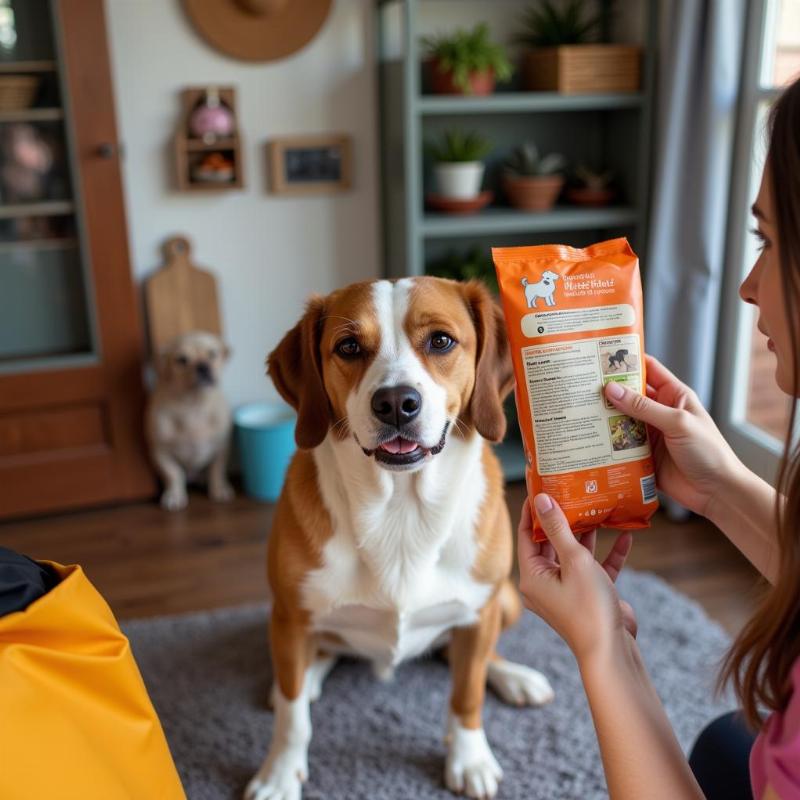Dog diarrhea in the middle of the night can be a distressing experience for both you and your furry friend. Waking up to a mess and a worried pup is never pleasant. Understanding the potential causes, knowing when to seek veterinary care, and learning how to manage the situation can help ease your concerns and get your dog back on track. This article will provide you with valuable information to navigate this common canine issue.
Understanding the Causes of Midnight Diarrhea
Several factors can contribute to dog diarrhea occurring specifically at night. Dietary indiscretion, perhaps scavenging something they shouldn’t have during the day, is a common culprit. Stress and anxiety, changes in routine, or underlying medical conditions like inflammatory bowel disease (IBD) or parasites can also play a role.
When to Seek Veterinary Care
While a single episode of diarrhea might not be cause for immediate alarm, persistent diarrhea, especially if accompanied by other symptoms like vomiting, lethargy, loss of appetite, or blood in the stool, warrants a trip to the veterinarian. If your dog appears dehydrated or in pain, it’s crucial to seek professional help immediately.
Managing Dog Diarrhea at Home
If your dog’s diarrhea seems mild and they are otherwise acting normally, you can take some steps at home to help manage the situation. Withholding food for 12-24 hours can allow the digestive system to rest. Make sure fresh water is always available to prevent dehydration. Once you reintroduce food, offer small, bland meals like boiled chicken and rice.
Preventing Future Episodes
Preventing future episodes of nighttime diarrhea involves careful attention to your dog’s diet, environment, and overall health. Avoid feeding table scraps and ensure your dog doesn’t have access to garbage or other potential toxins. Regular vet checkups can help detect and address any underlying health issues. Establishing a consistent routine can also help reduce stress-related digestive upset.
 Preventing Dog Diarrhea
Preventing Dog Diarrhea
Is Stress a Factor in Nighttime Diarrhea?
Yes, stress can absolutely be a contributing factor to nighttime diarrhea in dogs. Just like humans, dogs can experience digestive upset when they are anxious or stressed. Changes in routine, new environments, or even loud noises can trigger stress-induced diarrhea.
What Should I Do If My Dog Has Bloody Diarrhea at Night?
Bloody diarrhea is a serious symptom and requires immediate veterinary attention. It can indicate a severe infection, parasite infestation, or other underlying health problem. Do not delay seeking professional help.
Conclusion
Dealing with dog diarrhea in the middle of the night can be challenging, but understanding the causes, knowing when to seek veterinary care, and taking appropriate steps at home can help you manage the situation effectively. Prioritizing your dog’s overall health and well-being is key to preventing future episodes and ensuring a happy, healthy pup. Remember, if you are ever concerned about your dog’s health, it’s always best to consult with a veterinarian.
FAQ
-
How can I tell if my dog is dehydrated? Check for dry gums, sunken eyes, and loss of skin elasticity (the skin doesn’t spring back quickly when gently pinched).
-
What are some bland foods I can feed my dog with diarrhea? Boiled chicken, plain cooked rice, and pumpkin puree are good options.
-
Can over-the-counter medications help with dog diarrhea? It’s best to consult with your veterinarian before giving your dog any over-the-counter medications.
-
How can I clean up dog diarrhea safely? Wear gloves, use an enzymatic cleaner specifically designed for pet messes, and dispose of the waste properly.
-
When should I be concerned about the frequency of my dog’s diarrhea? If the diarrhea persists for more than 24 hours, or if it’s accompanied by other symptoms, consult your veterinarian.
-
Can certain dog foods cause diarrhea? Yes, food allergies or intolerances can trigger diarrhea.
-
Is it normal for my dog to have diarrhea after switching to a new food? Some digestive upset can occur after a food change. Transition gradually to the new food to minimize issues.
Related Articles
dog restless at night and panting
dog wakes up in middle of night whining
Beautdogs.us is your premier resource for all things dog-related in the United States. We offer expert advice on dog breeds, care, and products, catering to both new and experienced dog owners. Our goal is to provide comprehensive and reliable information to help you navigate the joys and challenges of dog ownership. For personalized guidance and support, contact us at [email protected] or call us at +1 501-555-7529. Beautdogs.us is dedicated to helping you build a strong and lasting bond with your canine companion.